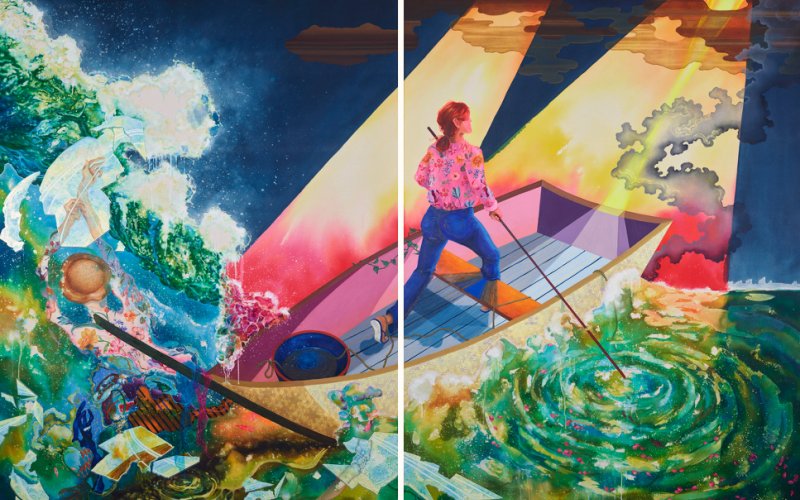A Grad Student Literary Journal Grabs International Attention

ALBANY, N.Y. (Dec. 9, 2021) — When the editors of the online literary magazine Entropy began assessing thousands of fictional works submitted by readers worldwide to choose its 40 “Best of 2020-2021,” a disproportionate number of winners, three, came from an international literary journal run by grad students — the University at Albany’s Barzakh.
“Emerging out of the English department . . . our focus is on innovative and experimental poetry and prose as well as socially engaged art,” state the editors of Barzakh on its website. Many in the world have taken notice — artists submitting works and readers avidly awaiting Barzakh’s annual spring publication, which features about 65 works of fiction, 15-30 works of poetry and, since 2018, a separate category for works of visual art.
The three writers that submitted short fiction to Barzakh and in 2020-21 and made Entropy’s 40 best list were Edward Derbes of Philadelphia, Clare Harmon of New Orleans, and Tript Kaur of India.
Professor of English Edward Schwarzschild, his department’s director of creative writing, has served as Barzakh’s faculty advisor the past four years. “This can’t be overstated,” he said, “it is the graduate students who run Barzakh. It’s their creation and it’s their serious effort and sincere devotion that has continued to make the journal an essential part of UAlbany campus culture as well as a powerful voice for international literature beyond the campus.”

Noting that the student staff of Barzakh works on the publication in addition to their responsibilities in research, writing and teaching, Schwarzschild said, “it strikes me as a true labor of love. It’s astounding and inspiring to me that during these incredibly challenging times these students not only continue to find time to make Barzakh happen, but they also manage to make Barzakh better and better, more compelling, more wide-ranging and more beautiful.”
Barzakh’s website states the journal assumes “an internationalist stance seeking work that transcends genre.” “Barzakh” is an Arabic word/concept that names the connecting link, the “between” of something, such as different spheres of existence.
The journal’s co-editor in chief, C. Connor Syrewicz, an English PhD student, can attest to the reach that the publication has achieved. Only one of the pieces he put in nomination to Entropy was chosen. “To my knowledge, no one else at Barzakh nominated any pieces,” he said. “Therefore, readers/ writers outside the UAlbany community had to have nominated some of our pieces — or perhaps the Entropy editors themselves read through the work in Barzakh and chose them.
“No matter how it happened, we sure are grateful to see that someone values the work that we've published in our digital pages as much as we do.”
Barzakh was born in 2009 and received a few dozen submissions in its early years. Now the number is in the hundreds. “I would say that’s due in large part to the networking and development efforts of our predecessors as editors,” said Kevin Kilroy, Barzakh’s other co-editor, who is a poet and fourth-year doctoral student in Writing Practices. He noted that the Barzakh team is now working on its first-ever fall/winter issue.
“As to how we’ve reached literary audiences worldwide, I’d say that has a lot to do with the magic of the internet," said Kilroy. “Like other litmags, we post calls for submissions on various forums and on social media, and we accept submissions through Submittable, which also makes us more visible in a variety of markets.
“But I'd also say it's in large part due to the hard work and keen eyes of our section editors and readers, who put in a ton of extra work to ensure that we're publishing the best of what we receive — which is not an easy task.”
Schwarzschild noted that the purchase of the subscription to Submittable was made possible by a Journal Support Award from the University. He also expressed gratitude for the help of the English department, the NYS Writers Institute and the Graduate School.




